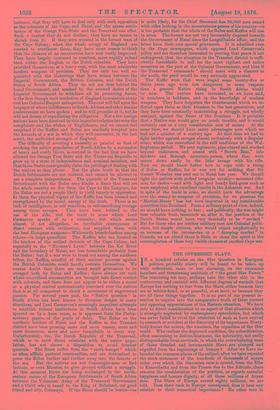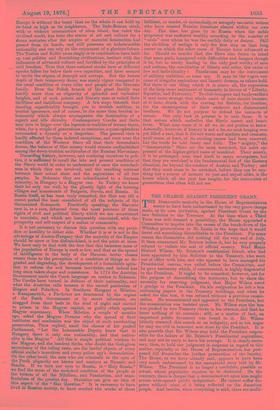THE OPPRESSED SLAVS.
IN a hundred articles on the Slav Question in European politics, probably ninety will be found to be taken up with reflections, more or less alarming, on the enormous numbers and threatening ambition of "the great Slav Power." The remaining ten may, perhaps, take the other side in the controversy, and contend with different degrees of warmth that Europe has nothing to fear from the Slays, either because they are so behind-hand, or so peaceful, or so inert, or because they are all these things together. It is no part of our present in- tention to inquire into the comparative truth of these current and opposing appreciations of the Eastern situation. We have only to direct consideration to an aspect of that situation which is strangely neglected by contemporary speculation, but which has never failed to rivet the attention of such as have arrived by research or accident at the discovery of its importance. Every- body knows the extent, the numbers, the capacities of the Slav world. Who realises the depressed condition, the subordination, often amounting to disfranchisement, the inferiority, not easily distinguishable from servitude, in which the overwhelming mass of those dreaded and innumerable Slays are plunged and engulfed from the beginnings of history ? After we have ex- hausted the common-places of the subject, after we have repeated the stock statement of the hundreds of thousands of square miles over which the Slavonian race is spread, from the Elbe to Kamschatka and from the Frozen Sea to the Adriatic, there remains the consideration of the position, as regards material happiness and human dignity, of all those millions of Aryan men. The Slays. of Europe exceed eighty millions, we are told. Does their rank in Europe correspond, does it bear any relation to their numerical importance ? No other race in Europe is without the boast that on the whole it can hold up its head as high as its neighbours. The Italo-Roman stock, with or without intermixture of alien blood, has ruled the civilised world, has been the centre of art and culture for a dozen centuries after the sceptre of material domination had passed from its hands, and still possesses an indestructible nationality and can rely on the enjoyment of a glorious future. The Teuton and Seltic races singly or in combination have built up vast polities and flourishing civilisations, instinct with the influences of advanced culture and fortified by the principles of civil freedom. True that these national stocks have at different epochs fallen far below their own capacities, and have seemed to invite the stigma of decrepit and corrupt. But the lowest depth of their temporary decay was manly vigour compared to the usual condition of every tribe and people of the Slavonic family. Even the Polish branch of the great family was hardly more than an oligarchy of splendid and turbulent knights, and of such priests and literary menus suited their thriftless and fastidious company. A few steps beneath that dazzling superficiality brought you to brutish serfdom, to brutish ignorance, and of course, to the more than brutish in- humanity which always accompanies the domination of a superb and idle chivalry. Contemporary Czechs and Serbs may love to linger over the legends or realities of former times, when, for a couple of generations or centuries, a quasi-splendour surrounded a dynasty or a despotism. The general view is hardly affected by these isolated exceptions, and even were the condition• of the Western Slays all that their descendants dream, the balance of Slav misery would remain undiminished among the down-trodden multitudes of the Russian Slavonians.
Discarding history, however, and confining ourselves to poli- tics, it is sufficient to recall the late and present condition of the Slavic world in order to understand at once the wretched- ness in which they are involved, and the resulting contrast between their actual state and the aspirations of all free peoples. In Bohemia they are subordinated to a German minority, in Hungary to a Magyar one. In Turkey we know their lot only too well, by the ghastly light of the burning villages and homesteads of Bulgaria, Servia, and Bosnia. In Russia itself, as has been truly remarked, the Slav was till a recent period the least considered of all the subjects of the Germanised Romanofs. Practically speaking, the Slavonic race is, as a rade, debarred from the most precious of those rights of civil and political liberty which we are accustomed to associate, and which are inseparably associated, with the prosperity and self-respect of a nation or community.
It is not necessary to discuss this question with any preju- dice or hostility to either side. Whether it is or is not to the advantage of Austro-Hungary that the majority of the Empire should be more or less disfranchised, is not the point at issue. We have only to deal with the fact that this immense mass of the population of Europe is sunk so low, and that as the spread of intelligence in the body of the Slavonic better classes rouses them to the perception of a condition of things so de- graded and degrading, the development of a formidable agita- tion to redress the evil becomes inevitable, and indeed has long since taken shape and consistence. In 1774 the Austrian Government made the Czech language an outlaw in Bohemia. The Czechs have turned in defence of their nationality, and what the Austrian calls treason is the sacred patriotism of Riegers and Palackys. In Southern Hungary a Miletics, a Kasapanovich, a Pavlovics are denounced by the organs of the Pesth Government or by secret informers, are dragged from their beds in the dead of night and carried to prison in the Magyar capital, as guilty rebels against Magyar supremacy. When Miletics a couple of months ago, asked the Magyar Premier why the spread of Serb institutes and academies was the object of such unrelenting persecution, Tisza replied, amid the cheers of his packed Parliament, "Let the honourable Deputy know that in Hungary there is only one nationality, and that nation- ality is the Magyar." All this is simple political wisdom to the Magyar, and the insolent Serbs, who doubt the God-given ascendancy of the ruling caste, are the lawful objects of every official scribe's invectives and every police spy's denunciation. On the other hand, the men who are criminals in the eyes of the Perth oligarchy are heroes and martyrs at Neusatz and Semlin. If we turn our eyes to Russia, to "Holy Russia," we find the sense of the wretched condition of the people at the bottom of all the Nihilism and Panslavism, and semi- Socialism Of the present day. thatistics can give no idea of this aspect of the "Slav Question." It is necessary to have lived in Russian society, to have studied the works of those brilliant, or tender, or melancholy, or savagely sarcastic writers who have created Russian literature almost within our own day. The time has gone by in Russia when the noble proprietor was reckoned wealthy according to the number of "souls" over whom he was the earthly deity or demon. Still the abolition of serfage is only the first step on that long career on which the other races of Europe have advanced so far. Should we wonder that the Slays also desire to tread that same path, hampered with difficulties and dangers though it be, but so surely leading to the only goal worthy of men and nations, the conciliation of liberty and order, the union of law and individuality ? Pa.nslavism may be the instrument of military ambition, as some say. It may be the vague out- come of irregular aspirations and fanatic dreams, as others hold. But there is one thing which it is above all, the expression of the deep inner sentiment of humanity in favour of "Liberty, Equality, and Fraternity." To club-loungers and boulevardiers it may seem strange that whole races of men should become, as it were, drunk with the craving for Reform, for freedom, for the emancipation of their enslaved and dishonoured brethren. We do not purpose to defend the instincts of nature. Our only task at present is to note them. It is that nature which underlies the Slavic unrest and heart- fever. What may come of it all we do not profess to know. Assuredly, however, if history is not a lie, no such longing ever yet filled a race, that it did not warm and madden and consume, until some, at least, of its exciting causes had been removed. Let the truth be told freely and fully. The "mighty," the " innumerable " Slays are the most wretched, the most op- pressed of the higher-gifted races of mankind. Their misery, if it be prolonged, may lend itself to many enterprises, but that they are wretched is the fundamental fact of the Eastern situation, far beyond the confines of Austria and Turkey; and that they must cease to be wretched, before they can be any- thing but a source of menace to just and unjust alike, is the lesson which all the past has taught, for the instruction of generations that often will not see.































 Previous page
Previous page